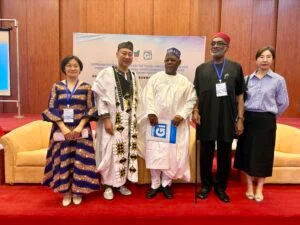Africa and China have reaffirmed commitment to accelerating the implementation of the China-Africa Cooperation 2035 Vision.
The initiative is aimed at building a community with a shared future anchored on peace, sustainable growth and people-centered development.
ThemomentNG reports that the commitment was made on Thursday during the 6th Abuja Forum.
The forum had as theme: “Deepening the Implementation of the China-Africa Cooperation 2035 Vision: Forging a Closer China-Africa Community with a Shared Future (Putting Theory into Practice).”
The annual forum, jointly hosted by the Gusau Institute (GI) and the Institute of African Studies at Zhejiang Normal University (IASZNU) is aimed at enhancing cooperation between Africa and China.
The cooperation is in areas such as defence and security,development, capacity building, economy and trade, and technology.
In her remarks made virtually, Dr Ngozi Okonjo-Iweala, Director-General of the World Trade Organisation (WTO), commended China and Africa for sustaining dialogue on practical cooperation amid growing global economic uncertainties.
“These are difficult times for the global trading system which faces its biggest disruption since the Second World War.
“But forums like this remind us that cooperation, not isolation, is the way forward.
“The China-Africa partnership stands out as an example of how developing nations can work together to create resilient, inclusive growth,” she said.
Okonjo-Iweala, noted that while Africa’s share in global trade remains low, current shifts in global supply chains offer a “unique window of opportunity” for the continent to attract value-added investments and strengthen industrial capacity.
“China has an opportunity to lead by investing in African value chains and enabling African economies to move up the ladder.
”By transferring technology, skills and know-how, Chinese investors can help raise productivity, create jobs, and expand markets that benefit both regions,” she said.
Okonjo-Iweala also urged African nations to prioritise infrastructure, manufacturing and African Continental Free Trade Area (AfCFTA) implementation to reduce trade costs and foster deeper economic integration.
“Africa’s youthful population and resource endowments are powerful assets.
“We must turn these advantages into engines of growth through partnerships like the China-Africa Vision 2035,” she said.
Also speaking, retired Lt.-Gen. Aliyu Gusau, the founder of the Gusau Institute, stressed that peace and security form the foundation for all meaningful development.
He called for strengthened cooperation between Africa and China to address insecurity in the Sahel and other conflict-prone regions.
“The 2035 Vision is a bold and structured framework for building a more equitable and resilient future.
“But the real challenge lies in implementation, in turning memoranda into mechanisms and dialogue into development.
”That is where institutions like ours must step up,” he said.
Gusau also commended the partnership between the Gusau Institute and Zhejiang Normal University (ZJNU), describing it as a model of think-tank collaboration that translates ideas into policy impact.
“Our cooperation with ZJNU shows that African and Chinese institutions can co-create solutions that serve both our peoples.
”Let this forum move us from talk to tangible results,” he said.
Prof. Xu Wei, Deputy Director (Academics) of the Institute of African Studies at Zhejiang Normal University, reaffirmed China’s readiness to deepen intellectual and policy cooperation with African partners.
“Over the six editions of the Abuja Forum, we have built a strong bridge between Chinese and Nigerian think tanks.
“Our goal is to make scholarly dialogue translate into practical policy and to ensure that cooperation benefits the ordinary people of both countries,” Xu said.
Similarly, Mrs Dong Hairong representing the Chinese Embassy in Nigeria, said China remained steadfast in supporting Africa’s modernisation and industrialisation agenda under the 2035 Vision.
“China and Africa share a destiny of common development.
“We will continue to support Africa’s efforts in infrastructure, agriculture, energy transition, and peacebuilding to ensure that no one is left behind,” she said.
Mr Mike Zhang, President of the Nigeria Chinese Business Association, highlighted the growing contribution of Chinese enterprises in Nigeria.
He noted that “business-to-people engagement” remains the bedrock of sustainable cooperation.
“Chinese businesses are not just investors; we are partners in Nigeria’s progress,” Zhang said.
“From renewable energy projects to agro-processing zones, we are investing in areas that create jobs and add value locally,” Zhang said.
Dr Joseph Ochogwu, Director-General of the Institute for Peace and Conflict Resolution (IPCR), said dialogue underlines Nigeria’s strategic role in shaping Africa-China relations.
He promised that the institute would continue to serve as a bridge between policymakers, researchers, and development partners.
“Nigeria occupies a central position in Africa-China cooperation,through the IPCR.
”We will continue to provide the research and policy support needed to turn shared aspirations into measurable outcomes,” he added.
NAN reports that participants at the forum included diplomats, senior government officials as well as scholars and policy experts from Nigeria, China, and other African countries.














